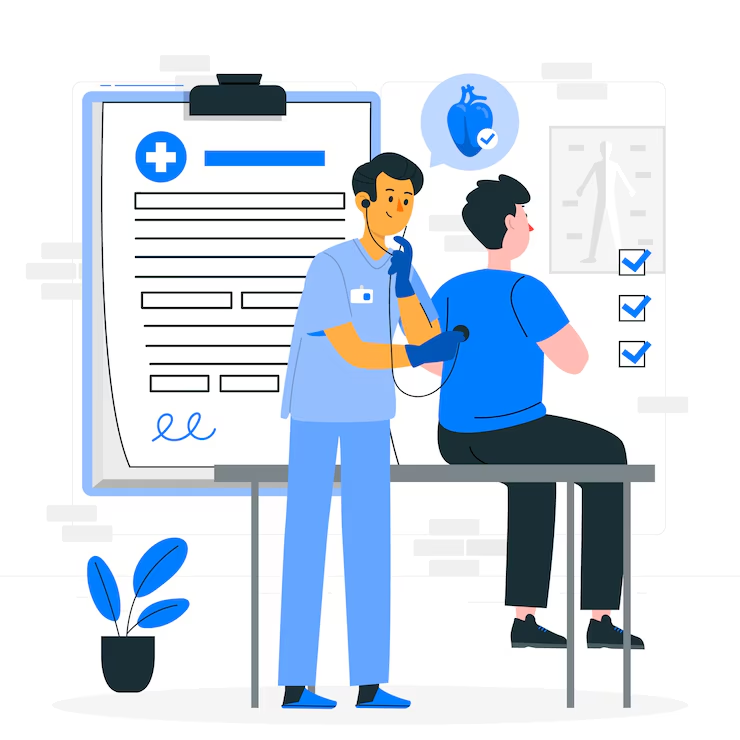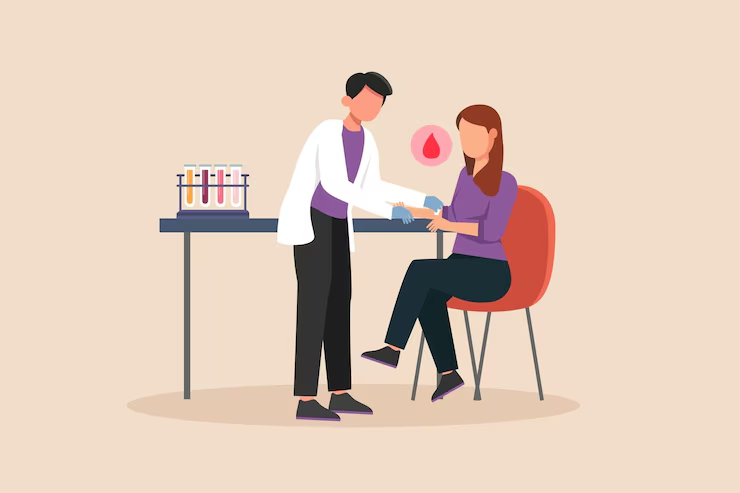Introduction
Not only are health checkups, remember, the regular components of the complete treatment, but they are also very essential for maintaining health for many years. Health checkups can sometimes prove themselves to be life-savers. These visits are not just a formality; they help in discovering potential health issues early, knowing how well particular established conditions are managed, and going beyond treatment to look at overall well-being.
Let us now turn to the article and list the 10 ways health checkups are life savers-from early detection of diseases to chronic disease prevention and vaccination, even providing lifestyle-modifying recommendations to mental health benefits, and so on. By knowing about life-saving benefits worth consistent medical monitoring, one will be empowered to make regular health checkups a non-negotiable item on their healthcare list.
10 Reasons for Regular Health Checkups
Amongst the most clever and effective ways to take control of your well-being is to give priority to regular health checkups. Blood tests are performed not only to settle health problems but also to keep a watchful eye on protecting against problems that could arise in the future. Here are ten serious reasons that may cause your life to be saved by turning health checkups into a regular activity in your lifestyle:

- Early Detection of Disease: Regular health checkups can detect diseases at an early stage when treatment is generally more effective and less invasive. If cancer, diabetes, or heart disease is found early, it has a good chance of being treated or even cured.
- Prevention of Chronic Conditions: Checkups permit the physician to evaluate risk factors and offer advice to prevent chronic conditions such as high blood pressure, high cholesterol, and type 2 diabetes from developing, worsening, or progressing.
- Monitoring of Existing Health Issues: Should you have an existing medical condition, routine appointments help ensure that your treatment is producing the desired results. Changes can be made before complications arise, so your health keeps moving forward.
- Timely Vaccinations and Screenings: Regular checkups keep you up to date on necessary immunizations and screenings, specific to your age. These do preventive work in shielding you from infections while diagnosing diseases at an early stage.
- Mental Health Support: The regular health check also opens up discussions about your emotional well-being. It may reveal signs of stress, anxiety, or depression and allow for early intervention and support.
- Personalized Lifestyle Recommendations: Personalized recommendations are given by a physician to meet your needs-whether it be nutritional guidance, physical activity, sleep, or cessation of unhealthy habits such as smoking or excessive drinking.
- Improved Long-Term Health Outcomes: Early detection of health problems and the initiation of a preventive care plan reduced the chances of complications, major surgeries, or hospitalization in the future; thus, creating a pathway to their long-term health and active lifestyle.
- Cost-Effective Healthcare: Regular health checkups offer preventive care, which is more economical than emergency treatment or the care for advanced diseases; thus, it helps you save healthcare costs in the long run.
- Better Awareness of Your Health: Regular checkups improve your information about your body, your medical history, and the warning signs of probable health troubles. This knowledge allows one to make informed decisions.
- Peace of Mind: It is reassuring to know that skilled hands are watching over your health. This reduces fears of unrecognized concerns and brings confidence to your wellness.
You Can Read Also: Bloating During Ovulation: Symptoms, Causes, and Treatment Options
Best preventive health screenings

Preventive health screenings are important parts of routine health check-ups and help detect health conditions very early on, sometimes even before symptoms appear, to offer prompt treatment and better prospects for recovery. The following are some of the most important preventive health screenings, which give the body a general check-up for overall well-being:
- Blood Pressure Checks: Hypertension is a silent killer for heart disease and stroke. Adults must undergo screening starting at 18, performed at regular intervals depending on their health status.
- Blood Cholesterol Testing (Lipid Profile): These tests measure both good and bad cholesterol in the blood. The test generally starts at the age of 20 and is recommended every 4 to 6 years, but this could change and be done sooner in someone who has factors such as obesity or a family history of heart disease.
- Blood Sugar Test (Fasting Glucose/HbA1c): This screening for diabetes or prediabetes is essential for everyone aged 35 and over, although those at higher risk may need testing sooner and more frequently.
- Body Mass Index (BMI) and Assessment of Obesity: Regular BMI assessment helps in recognizing the health risks associated with overweight and obesity: diabetes, cardiovascular disease, joint problems, etc. Health practitioners may also measure the circumference of the waist in that regard.
- Cancer Screening:
- Breast Cancer (Mammogram): For women from the age of 40 onwards or younger with a known family history.
- Cervical Cancer (Pap Smear and HPV Test): Women should be screened every 3 to 5 years if aged 21-65.
- Colorectal Cancer (Colonoscopy): Both men and women should begin at the age of 45 and be screened every 10 years or as recommended.
- Prostate Cancer (PSA Test): Men age 50 and older or younger with risk factors may consider being screened based on a physician’s recommendation.
- Skin Cancer: Regular skin checks should be encouraged, especially in high-risk groups having a history of sun exposure or any noticeable skin change.
- Liver Function Tests (LFT): This test is aimed at evaluating liver health and is important for people who consume alcohol regularly, take certain drugs, or may have fatty liver disease.
- Kidney Function Test: Very important for monitoring kidney function in high blood pressure, diabetes, or those with a family history of kidney problems.
- Eye Examination: An eye examination is encouraged every one to two years to check for vision, glaucoma, cataracts, and age-related changes.
- Hearing Test: Hearing tests need to be done periodically, especially on older adults and anyone having difficulty in either communicating or hearing.
- Bone Density Test (DXA scan): Very vital in the detection of osteoporosis and preventing fractures in women aged over 65, or younger post-menopausal women with risk factors.
- Thyroid Function Tests (TSH): For the detection of thyroid underactivity or overactivity in the population, particularly in women, older adults, or those with symptoms like fatigue or weight changes.
- Vitamin deficiency tests: Vitamin D, Vitamin B12 tests, are done on patients complaining of fatigue and weakness or who are on restricted diets.
You Can Read Also: Low Blood Sugar (Hypoglycemia): Causes, Symptoms, Management, and Prevention
Routine blood tests and their benefits
Blood testing is not only diagnostic but also provides vital information about the internal environment of the body and its well-being. Routine blood tests constitute an essential aspect of any health checkup, allowing a doctor to ascertain what’s happening on the inside, often before symptoms arise. Thus, when respect for these sinister signs is observed, blood tests provide the opportunity to safeguard against ailments and promote good health.
These tests are so broad in their spectrum that they encompass the composition of the blood, blood sugar and cholesterol levels, organ performance, hormones, and vitamins. Blood tests can be viewed as the timeline of a person’s health gleaned from review of blood test results over time, which helps in pointing out trends and changes that may otherwise be ignored.
Blood tests lend themselves to individualized medicine: tailoring your treatment, lifestyle changes, and dietary recommendations to your own individual needs, not general advice based on someone else’s situation. This becomes especially relevant when talking about risk factors related to age, inherited, or lifestyle considerations.
By making general blood tests part of your health maintenance, you are laying down the clarity, control, and confidence you want about how you feel. They are never taken in response to an illness; instead, they are the keys to preventive health measures, longevity, and enhanced quality of life.
Conclusion
The very fastest pace of modern life, keeping health as a priority through regular health checkups, represents one proven way to truly live healthily for a long time. Early detection of disease, preventing chronic diseases, and monitoring existing health issues while providing a means to personalize lifestyle recommendations are just some of the benefits of these regular checkups. Preventive screenings and blood tests can help in finding hidden health problems before they become life-threatening, thereby allowing for timely and inexpensive restorative measures. Another health virtue of being proactive is the peace of mind it brings, along with the ability to make better health choices.
Jaipur Hospital is the name that inspires confidence in reliable, professional, and completely comprehensive health checkup services. With state-of-the-art diagnostic facilities, an able and experienced team of medical professionals, and a patient-oriented approach, Jaipur Hospital offers the foremost operation to keep you one step ahead of potential risks to your health.


